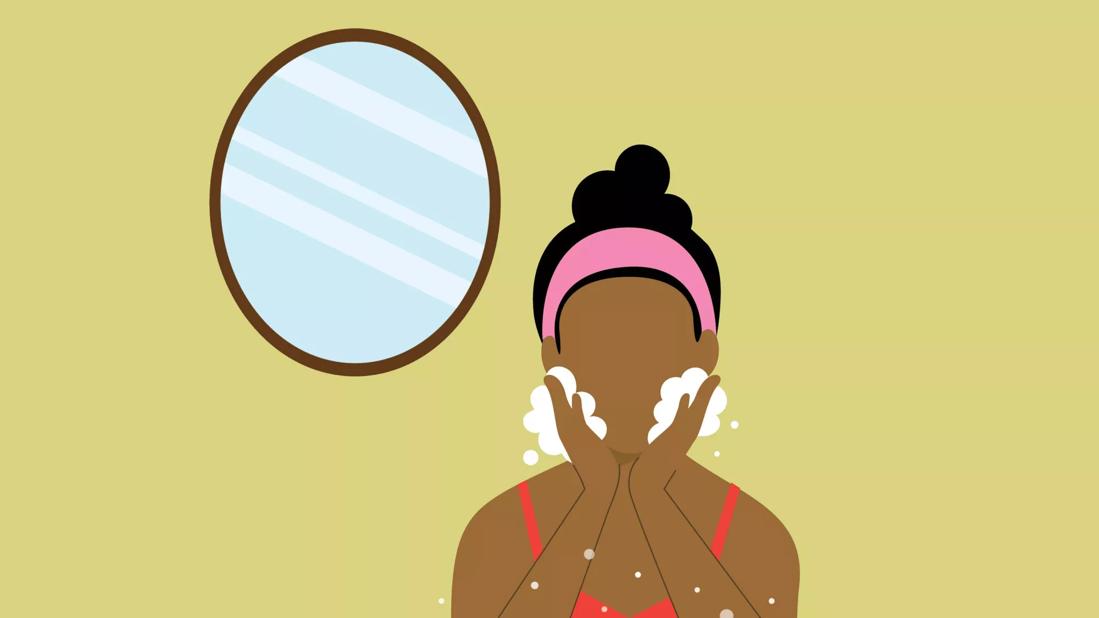When your skin is too acidic or too alkaline, you could experience acne, dryness and flakiness

Do you remember doing those high school chemistry experiments that tested the pH level of various substances? Your teacher passed out little strips of paper, and you exposed them to different kinds of liquid to see how acidic or basic they were.
Advertisement
Cleveland Clinic is a non-profit academic medical center. Advertising on our site helps support our mission. We do not endorse non-Cleveland Clinic products or services. Policy
If you didn’t grow up to become a scientist, you might think those tests (and those terms) would never be relevant to your life again. But if you care about your skin health, it’s worth revisiting those lessons of old.
Dermatology resident Taylor Bullock, MD, explains what pH means when it comes to your skin.
pH stands for “potential hydrogen,” where “potential” means “power.” It refers to how acidic a substance is — in this case, your skin. Everyone’s skin has its own pH, and bringing yours into balance can go a long way toward achieving the healthy skin you’re hoping for.
pH is measured on a scale of 0 to 14, with 7, right in the middle, representing a neutral pH. The lower a substance’s pH, the more acidic it is; the higher the pH, the less acidic it is. Put simply:
All kinds of things can affect the pH of your skin, including your diet, hygiene habits or which skin care products you use.
You might think that you’d want your skin to be a solid 7. Perfectly neutral, right? That’s a logical assumption, but it’s actually not the correct one.
“For adults, the skin’s normal pH is about 5.5, which is just a little bit acidic,” Dr. Bullock shares. “This acidity helps maintain the balance of the skin’s natural oils and protect it from harmful bacteria.”
Advertisement
The skin on your face and hands is typically more alkaline than the skin on parts of your body that aren’t exposed as often — think armpits, groin, etc.
“If your pH becomes too high or too low, that disrupts the skin’s natural microenvironment,” Dr. Bullock explains. “Your normal, healthy bacteria don’t grow as well, and the skin barrier doesn’t work as well.”
When the pH of your skin becomes too acidic or too basic, it can lead to skin issues:
Disrupted skin pH is associated with chronic skin conditions like:
If you’re experiencing ongoing issues with your skin — like acne, flaking, dryness or irritation — that’s probably a good sign that something is off. Left to your own devices, though, there’s no real way to test your skin’s pH level.
At least one skin care company offers a wearable sensor that claims to be able to tell you your skin’s pH and propose a new, customized skin care regimen for you. But the best thing to do it is always to see a dermatologist, who’ll know exactly what questions to ask to help identify whether your skin’s pH is off-balance.
“Once they’ve learned more about your skin care habits, your environment and how your skin behaves, they can provide guidance about what sort of products and practices are likely to be best for you, along with what you should avoid,” Dr. Bullock states.
When you’re choosing skin care products, it can be tough to know what they’ll do for your pH level. But there are some helpful clues and rules of thumb:
Advertisement
Learn more about our editorial process.
Advertisement

It’s a great disinfectant for around your home, but not for your skin

Changes in texture, smell, color and performance are signs it’s time to throw the cosmetic item away

Strengthening your skin barrier, simple routines and minimizing products are ongoing, popular trends

Moisturizing, running a humidifier and adjusting your showers may help keep itchiness and irritation at bay

Glycolic acid benefits skin tone, texture and pigmentation by exfoliating dead skin

Some gentle soap and warm water go a long way when you’re washing these cosmetic tools regularly

New formulas are less drying and contain water-based and skin-loving ingredients

At a minimum, in the morning, apply a cleanser, followed by a moisturizer and sunscreen, in that order

Wearing a scarf, adjusting your outdoor activities and following your asthma treatment plan can help limit breathing problems

Your diet in the weeks, days and hours ahead of your race can power you to the finish line

When someone guilt trips you, they’re using emotionally manipulative behavior to try to get you to act a certain way